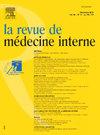Complications virales des biothérapies/thérapies ciblées anti-inflammatoires
IF 0.7
4区 医学
Q3 MEDICINE, GENERAL & INTERNAL
引用次数: 0
Abstract
By the end of the nineties, new immunomodulatory options impacting on the determinants of many immune-mediated diseases became available. These drugs were also called biologicals. Their use was associated with a significant improvement in the management of the patients and on their clinical evolution over time. On the other hand, their use was found to be also associated with an over-risk of infectious complications, in particular of viral origin, even though the savings of other at-risk treatments (e.g. corticosteroids or cyclophosphamide) allowed by these new therapies could have contributed to reduce it. These viral infections may be linked to an increased susceptibility to new infections because of impaired immunity and/or lower responsiveness to vaccination, to a higher risk of reactivation of latent infections, and to a higher severity than observed in the general population. Viruses mostly involved are respiratory (influenza, RSV, and SARS-CoV2), Varicella-Zoster, hepatitis B, or JC viruses, in particular. The viral risk depends not only on the type of biologicals, but also on the underlying disease, the associated comorbidities, the associated treatments, the epidemiological environment, and the individual and collective immunity. At an individual level, prevention and management of the infectious risk are of utmost importance in the global management of patients on biologicals.
求助全文
约1分钟内获得全文
求助全文
来源期刊

Revue De Medecine Interne
医学-医学:内科
CiteScore
0.70
自引率
11.10%
发文量
526
审稿时长
37 days
期刊介绍:
Official journal of the SNFMI, La revue de medecine interne is indexed in the most prestigious databases. It is the most efficient French language journal available for internal medicine specialists who want to expand their knowledge and skills beyond their own discipline. It is also the main French language international medium for French research works. The journal publishes each month editorials, original articles, review articles, short communications, etc. These articles address the fundamental and innumerable facets of internal medicine, spanning all medical specialties. Manuscripts may be submitted in French or in English.
La revue de medecine interne also includes additional issues publishing the proceedings of the two annual French meetings of internal medicine (June and December), as well as thematic issues.
 求助内容:
求助内容: 应助结果提醒方式:
应助结果提醒方式:


